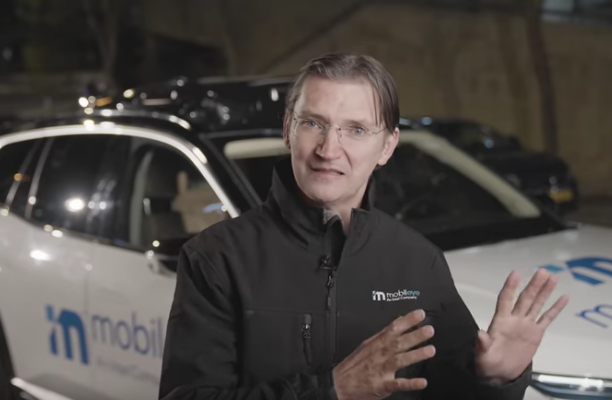The self-driving car traversed the city at night, in varying conditions of street light, executing turnabouts, avoiding jaywalkers, and handling itself around other vehicles.
By Pesach Benson
Mobileye, which is developing self-driving cars, took the bubble wrap off an advanced sensing system with the release of a 40-minute video showing one its “robotaxi” vehicles making its way around Jerusalem.
The video showed the car traversing the city at night, in varying conditions of street light, executing turnabouts, avoiding jaywalkers, and handling itself around other vehicles making illegal maneuvers.
It was the first display of Mobileye’s full autonomous vehicle (AV) system. Till now, Mobileye featured cars operating with just a camera subsystem.
“The demonstration of True Redundancy on real roads helps to dispel past industry skepticism that doubted whether Mobileye’s cutting-edge approach to environmental sensing could work,” the company said in a statement.
“More remarkable is the almost mundane quality to the video. The AV handles the drive more or less as a human would (and in some cases better), showing its near-readiness for planned robotaxi operations. Building on the already vast capabilities of Mobileye’s camera-first AV development fleet, the addition of radar-lidar to its sensor suite is the final piece to achieving what the company set out to do with its differentiated AV technology.”
The Jerusalem-based Mobileye is owned by the Intel Corporation and is collaborating with the German car rental company, SIXT SE and transit data company Moovit to develop a fleet of self-driving taxis, initially in Tel Aviv and Munich.
The fleet of self-driving electric cars, referred to as “robotaxis,” will use Mobileye technology for commercial use pending regulatory permission. SIXT will maintain and operate the vehicles both cities. Apps developed by Moovit and SIXT will allow people to hail a driverless ride.
Mobileye has been testing driverless autonomous vehicles in Tel Aviv since 2018. It has been running similar tests in New York, Detroit, Tokyo, Paris, Munich and Shanghai.
Meanwhile, the Israeli government announced on Wednesday the launch of an initiative to help autonomous driving pilot programs for public transportation. The 20 million shekel plan ($6.2 million) is being run by the Ministry of Transportation, the Israel Innovation Authority, the National Public Transport Authority and Ayalon Highways.
“The smart transportation initiative is expected to help dramatically with one of the biggest challenges facing the State of Israel: road congestion,” said Dror Bin, CEO of the Israel Innovation Authority.
“Moving to fleets of autonomous, driverless buses will help streamline the public transportation system, improve the level of safety, and deal with the shortage of drivers – all within a few years.”
